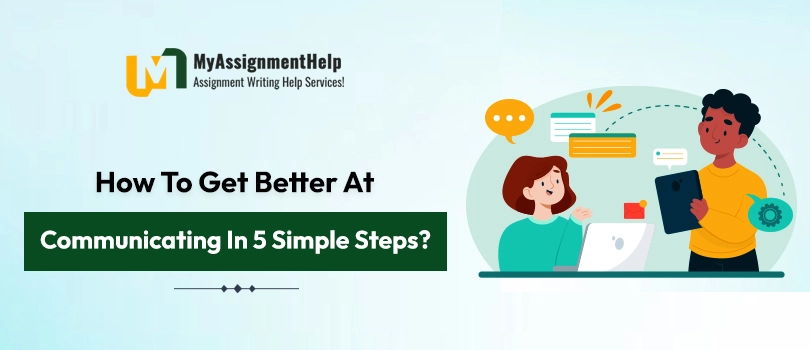Effective communication is a cornerstone of success in both personal and professional realms. Whether you’re a student seeking communication techniques assignment help or an individual looking to enhance your interpersonal skills, mastering effective communication is crucial. In this blog post, we’ll explore five simple steps to help you get better at communicating.

Active Listening: The Foundation of Effective Communication
The first step to becoming a better communicator is honing your active listening skills. Active listening involves fully concentrating, understanding, responding, and remembering what is being said. This technique not only ensures you grasp the information accurately but also shows the speaker that you value their input.
In the context of seeking communication techniques assignment help, active listening is especially important. When engaging with course material or discussing assignments, being attentive to instructions, clarifications, and feedback is key to academic success.
Clear and Concise Expression of Ideas
Communication is a two-way street, and being able to articulate your thoughts clearly is as important as understanding others. Practice expressing your ideas clearly and concisely. This involves avoiding unnecessary jargon, using simple language, and structuring your thoughts logically.
For students seeking all assignment help, clear communication with professors, classmates, or assignment help services is vital. Precise communication ensures that you convey your requirements accurately, leading to better assistance and improved academic performance.
Non-Verbal Communication Awareness
Communication is not limited to words alone; non-verbal cues play a significant role in conveying messages. Pay attention to your body language, facial expressions, and gestures, as they can either reinforce or contradict your spoken words. Similarly, being attuned to the non-verbal signals of others enhances your understanding of their sentiments.
In the realm of communication techniques assignment help, being aware of non-verbal cues can aid in deciphering instructions or feedback from instructors. It also contributes to effective collaboration with classmates during group assignments or discussions.
Empathy: Understanding Others’ Perspectives
Empathy is the ability to understand and share the feelings of another. Cultivating empathy is a powerful tool in effective communication. By putting yourself in others’ shoes, you gain insights into their perspectives and motivations. This understanding fosters meaningful connections and minimizes misunderstandings.
For students seeking all assignment help, empathy is valuable in group projects and collaborative assignments. Acknowledging diverse viewpoints enhances teamwork and leads to more comprehensive and well-rounded outcomes.
Continuous Learning and Adaptability
Communication is a dynamic skill that evolves with practice and experience. Embrace a mindset of continuous learning and adaptability. Seek feedback on your communication style, reflect on your interactions, and be open to refining your approach based on the context and audience.
In the context of communication techniques assignment help, adaptability is crucial in adapting to different communication styles of instructors or collaborating effectively with peers who may have diverse communication preferences.
Conclusion: Mastering Communication for Academic and Personal Success
Effective communication is a skill that transcends academic settings, benefiting individuals in their personal and professional lives. Whether you’re navigating the complexities of coursework, seeking communication techniques assignment help, or striving to enhance your interpersonal skills, these five simple steps serve as a foundation for success.
By actively listening, expressing ideas clearly, being mindful of non-verbal communication, practicing empathy, and embracing continuous learning, you can elevate your communication skills. Remember that communication is a skill that can be developed and refined over time, leading to improved academic performance, enriched relationships, and increased confidence in expressing yourself effectively.





